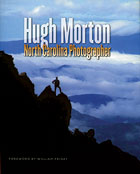 |
Could there be anyone who loved North Carolina more?
Months after his death, this question about Hugh Morton, from a book review in The News & Observer of Raleigh, keeps coming back to me.
Since Morton’s passing, the lengthy list of his accomplishments and causes has been duly noted: the preservation of Grandfather Mountain, the saving of the USS North Carolina. His work to save the Cape Hatteras Lighthouse. His expanding campaign to improve air quality in the mountains.
The list goes on and on, and each time I hear or read about Morton, I learn of some new accomplishment or cause he championed. I found out from UNC-Chapel Hill Athletic Director Dick Baddour, for instance, how tenaciously Morton worked for the big statue of football hero Charlie “Choo Choo” Justice (an Asheville native) near Chapel Hill’s Kenan Stadium.
Many people know Hugh Morton best as a photographer, and Morton surely wouldn’t mind: He was proud of what many believe was his favorite role.
“Who is that older man sitting on the sidelines taking pictures?” is a question I often heard from visitors during basketball games at Carolina’s Dean Dome. For more than 60 years, Morton followed and chronicled UNC-Chapel Hill sports.
Sports photography, he wrote, “provided me with lessons for living. The importance of sportsmanship is probably the most valuable lesson one can learn from athletic competition, even surpassing the need for competitiveness itself. The rogues and bums in sports sometimes sell more tickets, but the true heroes in the public eye carry themselves well, and above all they are good sports in their deeds and in their statements. Teamwork, competitive spirit, dedication and loyalty — you see all of that in sports, and as a sports photographer you are privileged to see it up close and personal.”
Much more important, however, is the record of North Carolina and its people that Morton made during this time. His various activities constantly took him all over the state. His prominence and winning personality gave him access to people and places that wouldn’t necessarily be available to the rest of us.
With diligence and great skill, Morton created tens of thousands of images of North Carolina covering much of the 20th century. Thanks to his and his family’s generosity, this collection will be available to all Tar Heel residents as part of UNC’s Southern Historical Collection.
The publication of Hugh Morton’s North Carolina (University of North Carolina Press, 2003) made hundreds of his best photos conveniently available. The book proved so popular that just before his death, Morton rushed to assemble a second volume, Hugh Morton: North Carolina Photographer (University of North Carolina Press, 2006). Thanks to these wonderful photographs, Morton’s name will be familiar for generations to come among people who love this state.
As fine a legacy as these photographs are, however, Hugh Morton’s great gift to me was his example of personal commitment to worthy causes. The causes he picked were important, but often they weren’t sure bets. In fact, some of Morton’s greatest accomplishments involved what had been lost causes until he got involved. But once Morton signed on, he fought for his project tooth and nail.
WRAL-TV’s Bill Leslie captured this side of Morton very well. “Hugh was Mr. Tenacity. He seized upon an issue with laser-beam focus, studied it thoroughly, carved out a position, stuck to it and rallied the troops to bring about corrective change. He wasn’t always successful, but you couldn’t help admiring his passion and conviction. Hugh Morton wasn’t a slap-your-back, joke-it-up charmer. His speech was almost quiet at times; he was even-keeled and always the gentleman. More than anything else he was thoughtful, sincere and genuine, and I think that’s what really won me over.”
Those same qualities made Morton an important role model for me. And the fact that he loved North Carolina so much was really only icing on the cake.
[D.G. Martin is the host of UNC-TV’s North Carolina Bookwatch.]



Before you comment
The comments section is here to provide a platform for civil dialogue on the issues we face together as a local community. Xpress is committed to offering this platform for all voices, but when the tone of the discussion gets nasty or strays off topic, we believe many people choose not to participate. Xpress editors are determined to moderate comments to ensure a constructive interchange is maintained. All comments judged not to be in keeping with the spirit of civil discourse will be removed and repeat violators will be banned. See here for our terms of service. Thank you for being part of this effort to promote respectful discussion.